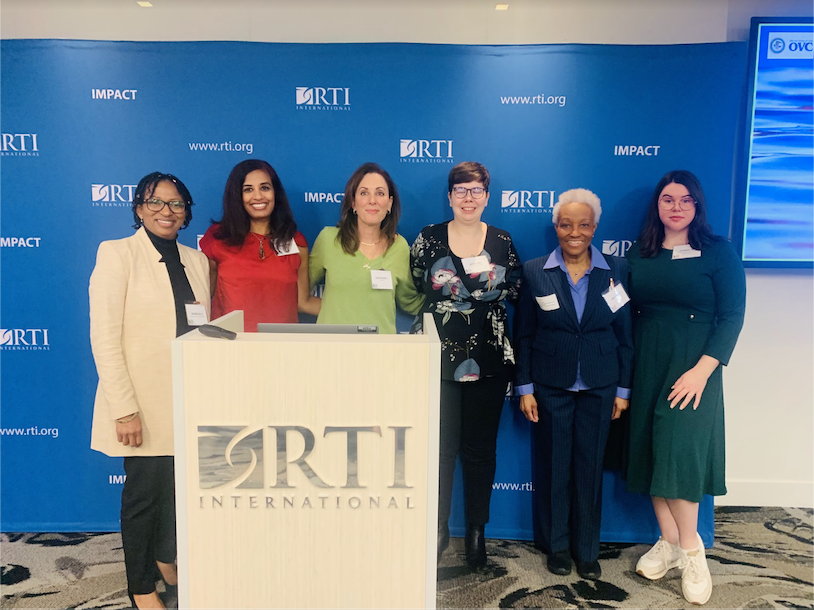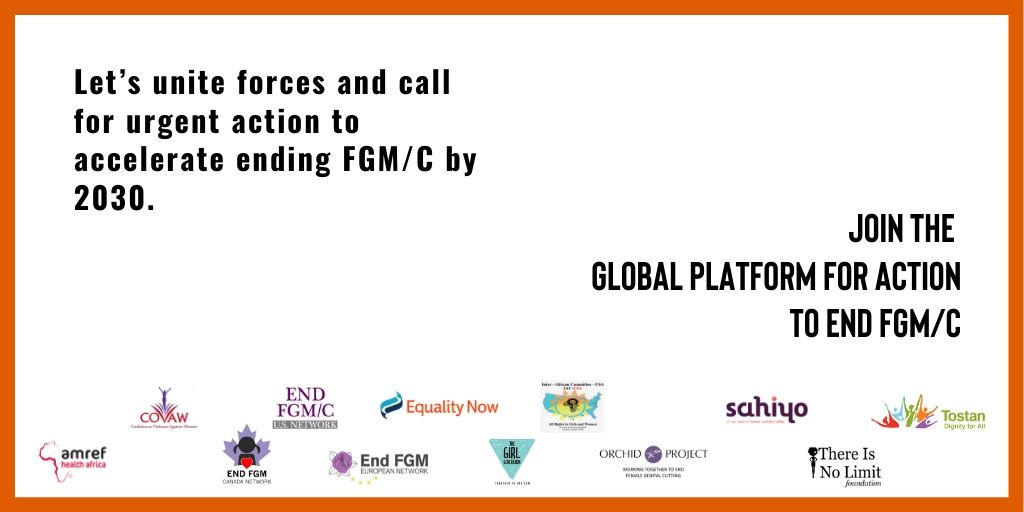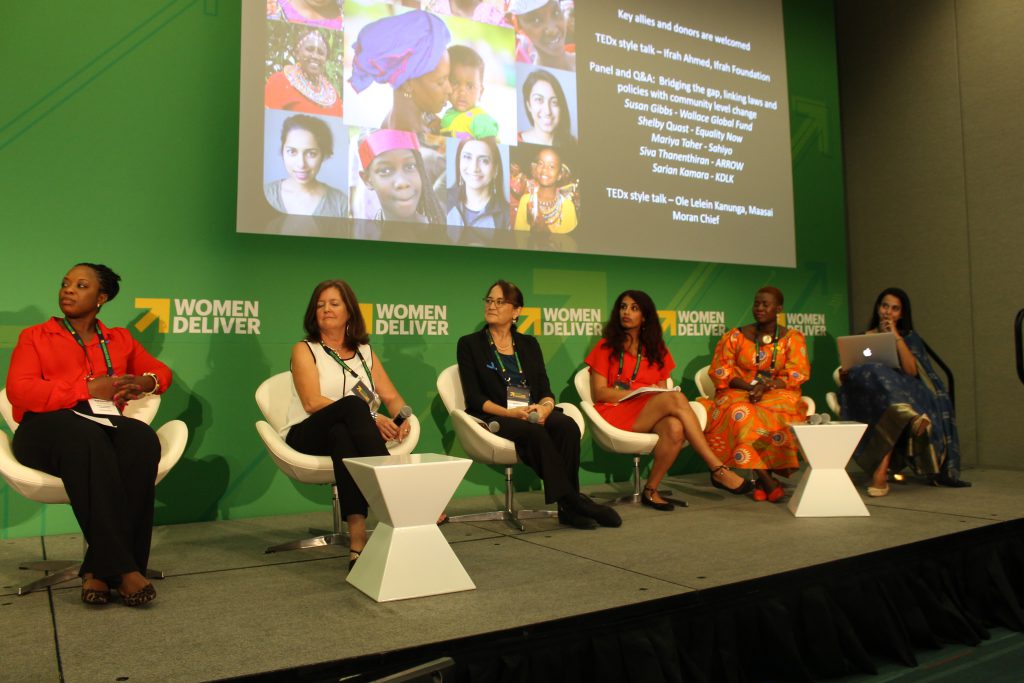Sahiyo convenes with other OVC grantees in Washington, DC

In 2020 and 2021, the Department of Justice – Office for Victims of Crime (OVC) awarded grants to organizations across the U.S. who deliver community-based programming to end FGC. The goal of this grant was to encourage educating communities and forming community networks of agencies and organizations that were positioned to identify those at risk and respond to survivors. Sahyo, in partnership with Asian Women’s Shelter (AWS) and StoryCenter, was awarded one of these three-year grants. At the end of January 2023, Sahiyo U.S.attended the OVC grantee convening in Washington DC. Over the course of the two-day gathering, participants were able to network, discuss challenges and opportunities in their work with FGC survivors, and build strategies and skills to take back and implement in their programming. During the event, Sahiyo’s Executive Director Mariya Taher facilitated two workshops, the first around strategies to build survivor engagement in programming, and the second looking at effective solutions to encourage male engagement in the work to end FGC. To learn more about Sahiyo’s work with AWS, visit our Technical Assistance page.
Op-Ed: A Global Platform to End FGM/C

We must accelerate an end to FGM/C. Every 11 seconds a girl somewhere in the world will go through female genital mutilation/cutting (FGM/C.) The procedure is often extremely painful, and carried out with a crude, unsterilized instrument and without anesthesia. Every 11 seconds. FGM/C has no medical benefits, and often has disastrous effects, including a lifetime of psychological trauma, difficulty urinating and menstruating, maternal and child mortality, lack of sexual fulfilment, and sometimes, most tragically, the loss of a girl’s life afterwards. This violation of a girl’s fundamental human rights has no place in the world today. It must stop. Now. Last June at the Women Deliver Conference held in Vancouver, for the first time, global FGM/C activists from Africa to Europe, from Australia to Asia and to North America; women and men, civil society organisations, champions, survivors, and grassroots representatives, all came together to unite voices around a global call to action to end FGM. Together, we are asking, no imploring, the international community to prioritize the ending of FGM/C worldwide, in the same way it responded to other urgent global issues such as HIV/AIDS. It’s estimated that 200 million women alive today are survivors of FGM/C. It is practiced on every continent except Antarctica. There’s no religious requirement for it, and it is practised in Muslim, Christian, Pagan, and even some Jewish communities. There can be little doubt that female genital mutilation/cutting is among the worst human rights violation perpetrated against women and girls in the world today. The practice continues because it is a social norm held in place by the expectations of whole communities–women, men, elders, even politicians. And it continues to be a taboo subject, hidden behind a wall of silence around the world. This too must stop. Next week, at the International Conference on Population and Development (ICPD) in Nairobi, where gender equality and reproductive and sexual rights are high on the list of priorities, there is a tremendous opportunity to shine a giant light on the issue of FGM/C and move it firmly to the top of the agenda where it belongs. Kenya’s President Uhuru Kenyatta, sitting beside Canada’s Prime Minister Justin Trudeau at Women Deliver in Vancouver just a few months ago, courageously committed to ending FGM/C in Kenya by 2022, eight years ahead of the Sustainable Development Goal of 2030. It’s an ambitious promise, a challenging target for sure–but it shows leadership, it shows vision, it shows a commitment to the idea that girls’ human rights must be cherished, must be protected. We hope that other governments around the world will follow and commit resources, improved data and research, laws and policies to protect girls at risk, and support for survivors, so that together we can end FGM/C around the world. The End of FGM/C is not just the end of a violation of girls’ human rights, it is also the start of increased economic development for practicing communities and has the power to be completely gender transformative. It is a proven fact that when girls and women fully participate in the economy of a country, it results in significant economic advancement. And so, we ask the global community at the ICPD to join us, to work together on a multi-pronged approach to end FGM/C by 2030. Whole communities must be mobilized and empowered at the grassroots level. Women and men, girls and boys, health workers, traditional and religious leaders, all have to be empowered to embrace the end of this harmful traditional practice. We have to address the root causes of gender equality at the community level; we have to listen to and support grassroots organizations that are working in this field; we need an integrated, intersectional approach to ending FGM/C, recognizing the connections with other forms of gender-based violence and linking with existing movements. We have to work with governments to respond to the adaptations to this violation of girls’ and women’s human rights, include medicalization, cross-border practices, and lowering the age of mutilation/cutting. Accordingly, we call on all stakeholders to prioritize resources towards grassroots and community led programmes, and to make funding more flexible, sustainable, and accessible. Whatever our religion, our gender, our ethnicity, –the time has come for every one of us and all our governments to deploy every tool at our disposal to end this harmful practice. FGM/C is a human rights emergency that continues to exact untold harm on a daily, hourly basis. Together we can end it. Sign up to the Global Platform for Action to End FGM/C today at www.ActionToEndFGMC.org. This call to action has been endorsed by Amref Health Africa, Coalition on Violence Against Women, End FGM Canada Network, End FGM European Network, Equality Now, Orchid Project, Sahiyo, The Girl Generation, The Inter-African Committee on Traditional Practices, The US End FGM/C Network, There Is No Limit Foundation and Tostan.
Global Call to Action From “Uniting forces to make female genital mutilation/cutting a practice of the past: A gathering for global civil society actors”

On June 2, 2019 in Vancouver, Canada, civil society organisations, champions, survivors and other grassroots representatives came together at Women Deliver 2019 to unite voices around a global Call to Action to end female genital mutilation/cutting (FGM/C). The pre-conference was an unprecedented gathering as a sector working globally across the issue to discuss what is needed to accelerate ending FGM/C by 2030. The event put grassroots voices at the centre and worked to strengthen our unified community of practice to support the achievement of Sustainable Development Goal 5.3. (eliminate all harmful practices, such as child, early and forced marriage and female genital mutilation). “Uniting forces to make female genital mutilation/cutting a practice of the past: A gathering for global civil society actors” involved more than 100 participants in Vancouver. More than 270 additional participants shared their expertise and experience through an online survey. The event was co-ordinated through a core group of globally representative organisations that managed logistics: Amref Health Africa, Coalition on Violence Against Women, End FGM Canada Network, End FGM European Network, Equality Now, Orchid Project, Sahiyo, The Girl Generation, The Inter-African Committee on Traditional Practices, The US End FGM/C Network,There Is No Limit Foundation and Tostan. Participants in Vancouver endorsed the following Call to Action: PREAMBLE FGM/C is a violation of the human rights of women and girls and must be ended in all its forms We need to make FGM/C a global priority, in the same way the global community responded to other global epidemics, such as HIV/AIDs SUPPORTING CHANGE FROM WITHIN – CHALLENGING SOCIAL AND GENDER NORMS We share a vision of a world free from FGM/C and will work in partnership with each other, all communities, governments, donors, multilateral bodies and others to end the practice by 2030 in line with the SDGs Whole communities must be mobilised and empowered at the grassroots level if we are to end FGM/C – women and girls, men and boys, traditional and religious leaders, health workers Ending FGM/C requires addressing the root causes of gender inequality at the community level, including gender stereotypes, unequal power relations, and negative social norms STRENGTHENING THE EVIDENCE BASE THROUGH CRITICAL RESEARCH Fill the knowledge gap on FGM/C survivors’ specific needs, impact on economic empowerment, and behaviour change around emerging trends such as medicalisation and lower ages of cutting Use community-based participatory approaches within research efforts and ensure that research results and data are synthesised for communities to use Create, test, and implement standardised universal indicators that are informed by context specific measures and demand country-level reporting IMPROVING WELLBEING VIA SUPPORT AND SERVICES FOR SURVIVORS More support is needed for survivors in various forms, including security and protection for survivors, targeted research and resources to enable health and emotional wellbeing Enable the transformative power of survivors and survivor-led networks through support to connect with each other, other gender-based violence movements and capacity build ADDRESSING EMERGING TRENDS AROUND FGM/C We need an integrated, intersectional approach to ending FGM/C recognising the connections with other forms of gender-based violence and linking with existing movements We are committed to working with religious leaders, health workers and governments to respond to adaptations to the practice which continue to violate women’s rights, such as medicalisation, cross-border practices, and lowering the age at which FGM/C is carried out INCREASING RESOURCES TO ACHIEVE THE GLOBAL GOAL We call on all stakeholders to prioritise resources towards grassroots and community-led programmes. Funds should be more flexible, sustainable and accessible for communities and grassroots and capacity building should be provided as well as networks Investment is needed in better research into what is working and what is not to end FGM/C. This research needs to be participatory and involve multiple stakeholders and should be made available and accessible We are focused on coming together and working collaboratively to address what existing gaps there are, what are the costs of FGM/C, and what do we need to end this globally See call to action as PDF here. Further Women Deliver blog posts: Joint Press Release: Ending FGM/C BY 2030: Uniting forces to make FGM/C a practice of the past Multiple events on FGC hosted at Women Deliver in Vancouver
Multiple events on female genital cutting hosted at Women Deliver in Vancouver

From June 2 to June 6th, Sahiyo co-founder, Mariya Taher took part in Women Deliver 2019 held in Vancouver, Canada this year. Over 8,000 participants took part in the conference and for the first time ever, a pre-conference on Female Genital Cutting was held on June 2nd, a day before the official start of the Women Deliver Conference. The preconference, “Uniting Forces to Ensure Female Genital Mutilation/Cutting (FGM/C) is a Practice of the Past” was an unprecedented event from civil society for civil society to unite voices and come together around a global Call to Action to end FGM/C and support FGM/C survivors. The event convened civil society organizations, champions, survivors and other grassroots representatives from across the globe to come together as a sector, to get to know others working globally across this issue, and to discuss what is needed to accelerate ending FGM/C by 2030. A global call to action was created out of the preconference by the participants in attendance, which was referenced throughout the entire duration of the conference and the various side-events on FGM/C held from June 3rd to June 6th. Other side events in which Sahiyo took part in as a panelist or speaker included: A screening of ‘In The Name of Your Daughter’ with a panel discussion afterwards entitled ‘FGM and the West — Is it our issue too?’ ‘It takes a whole community: Ending female genital cutting within a generation’ – hosted by Orchid project, this event was a highly participatory, activist-led, interactive workshop on community-based approaches to ending female genital cutting (FGC) within a generation. Featuring grassroots and civil society activists from East and West Africa, Asia, and North America, this session shined a light on effective community-led strategies to shift social norms and end FGC. ‘Ending FGM by 2030: It’s a global issue’ hosted by Equality Now. With a little over a decade before the 2030 target to end FGC, this interactive panel session and audience Q&A explored two vital challenges/themes/hurdles our international community must address to achieve to protect every woman and girl from FGC: 1) How do we measure, invest and support each of the 193 countries who have committed to end FGM, including especially in Asia Pacific, the Middle-East, the Americas, Europe and Eurasia? 2) How can activists, CSOs, intergovernmental bodies, and funders move forward as one to hold States, International and regional bodies and donors to account to end FGM globally by 2030? To learn more about Women Deliver and impact of the Preconference and side-events, check out related media coverage: World leaders urged to make female circumcision a priority like HIV Activist push for end to female genital mutilation and call for Asia Network Sierra Leone’s first lady confronted over FGM controversy Further Sahiyo Blog Posts on Women Deliver: Joint Press Release: ENDING FGM/C BY 2030: Uniting forces to make FGM/C a practice of the past Global Call to Action From “Uniting forces to make female genital mutilation/cutting a practice of the past: A gathering for global civil society actors”
Joint Press Release: ENDING FGM/C BY 2030: Uniting forces to make FGM/C a practice of the past

Download Press Release as PDF JOINT PRESS RELEASE: ENDING FGM/C BY 2030: Uniting forces to make FGM/C a practice of the past 2nd June 2019, Vancouver (Canada) 3.9 million girls are at risk of female genital mutilation/cutting (FGM/C) every year. On the 2nd June 2019, for the first time ever, NGOs, grassroots and survivor-led organizations from around the world came together at the Women Deliver conference around a common goal: to end FGM/C by 2030 and to support survivors of the practice. This is our Call to Action. FGM/C is happening on every continent except Antarctica: it is a global issue that needs a global response, which is why we have come together – across Asia, Africa, Europe and North America – to build a unified platform for action. Together, we represent no less than 38 countries from all regions of the world. The time has come to make FGM/C a global priority, in the same way the community responded to urgent global epidemics, such as HIV/AIDs. FGM/C is a violation of the human rights of women and girls and must be ended in all its forms. Whole communities must be mobilised and empowered at the grassroots level if we are to end FGM/C – women and girls, men and boys, traditional and religious leaders, health workers, law and policy makers. During the opening plenary of the Women Deliver conference, His Excellency Uhuru Kenyatta, President of Kenya, committed to end FGM/C in Kenya by 2022. We welcome this and call on all global leaders at the conference, and beyond, to commit to end FGM/C. To put an end to the harmful practice of FGM/C, we will work in partnership with each other, all communities, governments, donors, multilateral bodies and others to end the practice by 2030 in line with the Sustainable Development Goals (SDGs) determined by the UN. Together, we will challenge the social and gender norms by addressing the root causes of gender inequality at the community level, including gender stereotypes, unequal power relations, and negative social norms. Because this is what holds the continuation of FGM/C in place: control of the female body, of women’s sexuality and of their freedom to decide for themselves. We must also acknowledge our current failure in providing adequate support systems for FGM/C survivors. We need to provide security and protection, targeted research and resources to enable health and emotional wellbeing as well as post-trauma support. We also need to better understand and respond effectively to adaptations to the practice which continue to violate women’s rights, such as medicalization, cross-border practices, and lowering the age at which FGM/C is carried out. Investment is needed in increased and better research into what is working, and what is not working, to end FGM/C. Funds should be more flexible, sustainable and accessible for communities. We need an integrated, intersectional approach to ending FGM/C, recognising the connections with other forms of gender-based violence and linking with existing movements. We are focused on coming together and working collaboratively to address what existing gaps there are, making sure that FGM/C is a practice of the past. Signatories: Amref Health Africa COVAW End FGM Canada Network End FGM European Network Equality Now Orchid Project Sahiyo The Girl Generation There Is No Limit Foundation The Inter-African Committee on Traditional Practices Tostan US End FGM/C Network What is FGM/C? It is estimated that 3.9 million girls and women underwent the practice of female genital mutilation/cutting (FGM/C) in 2015 alone (source: UNFPA). FGM/C comprises all procedures that involve partial or total removal of the external female genitalia, or other injury to the female genital organs for non-medical reasons. FGM/C is recognized internationally as a violation of the human rights of girls and women. It reflects deep-rooted inequality between the sexes and constitutes an extreme form of discrimination against women. It is nearly always carried out on minors and is a violation of the rights of children. The practice also violates a person’s rights to health, security and physical integrity, the right to be free from torture and cruelty, inhuman or degrading treatment, and the right to life when the procedure results in death. Further Women Deliver blog posts: Multiple events on FGC hosted at Women Deliver in Vancouver Global Call to Action From “Uniting forces to make female genital mutilation/cutting a practice of the past: A gathering for global civil society actors”
